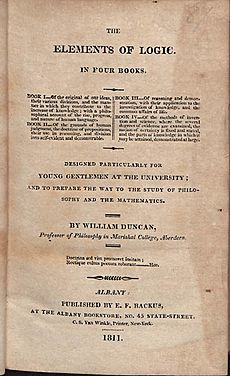Gnosiology facts for kids
Gnosiology is a big word that means the "study of knowledge." It's a part of philosophy that looks at how we know things and how our minds work. Sometimes, especially in places like Italy or Russia, it's used to mean the same thing as epistemology, which is another word for the study of knowledge. You might also hear this word when talking about Eastern Christianity.
Contents
Where Does "Gnosiology" Come From?
The word "gnosiology" comes from two old Ancient Greek words:
- Gnosis (γνῶσις), which means "knowledge."
- Logos (λόγος), which means "word" or "study."
So, "gnosiology" literally means "the study of knowledge." It's similar to the word epistemology, which also comes from Greek words meaning "certain knowledge" and "study."
Today, "gnosiology" isn't a very common word in English. Even back in 1911, the Encyclopædia Britannica noted that it wasn't widely used. However, in Modern Greek, the term is used more often.
Understanding Knowledge in Gnosiology
In philosophy, gnosiology looks at how we gain knowledge. Ancient Greek thinkers believed knowledge came from:
- What we learn through our senses (like seeing or hearing).
- What we understand with our intellect (our thinking mind).
- How we store this information in our memory.
When we think about gnosiology in science, it means studying:
- Where knowledge comes from.
- How we process information.
- How we know if our knowledge is true or correct.
Gnosiology explores different kinds of knowledge, such as:
- Knowledge from memory.
- Knowledge from experience (like learning from trying things).
- Knowledge from logic (like figuring things out step-by-step).
- Knowledge from science (like making smart guesses and testing them).
- Knowledge from deep contemplation or thinking.
- Knowledge that feels intuitive or like an instinct.
It focuses on how our minds understand and process information.
Gnosiology in Philosophy and Esoteric Studies

In philosophy, gnosiology is the study of gnosis, which can mean knowledge or special, hidden knowledge. This study can cover many topics, including:
- Magic (in a philosophical sense).
- How the mind works (called noetics).
- Different ways of thinking logically.
Some philosophers, like Johann Gottlieb Fichte, used gnosiology to describe their ideas about how we gain knowledge, calling it the "Doctrine of Knowledge."
Intuition and Knowledge
The philosopher Immanuel Kant also talked about gnosiology. He believed that intuition (a feeling or understanding that comes without conscious reasoning) was very important. He saw intuition happening in two ways:
- Through our senses, like when we feel something.
- Through our intellect, like when we understand a complex idea.
Kant thought that some minds could gain knowledge directly from things themselves, while others created knowledge by just thinking about them.
See also
 In Spanish: Gnoseología para niños
In Spanish: Gnoseología para niños
- Anosognosia
- Aseity
- Epistemology
- Nikolay Lossky
- George Metallinos
 | Kyle Baker |
 | Joseph Yoakum |
 | Laura Wheeler Waring |
 | Henry Ossawa Tanner |

